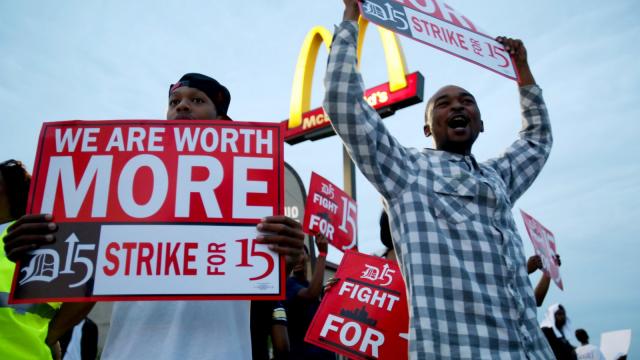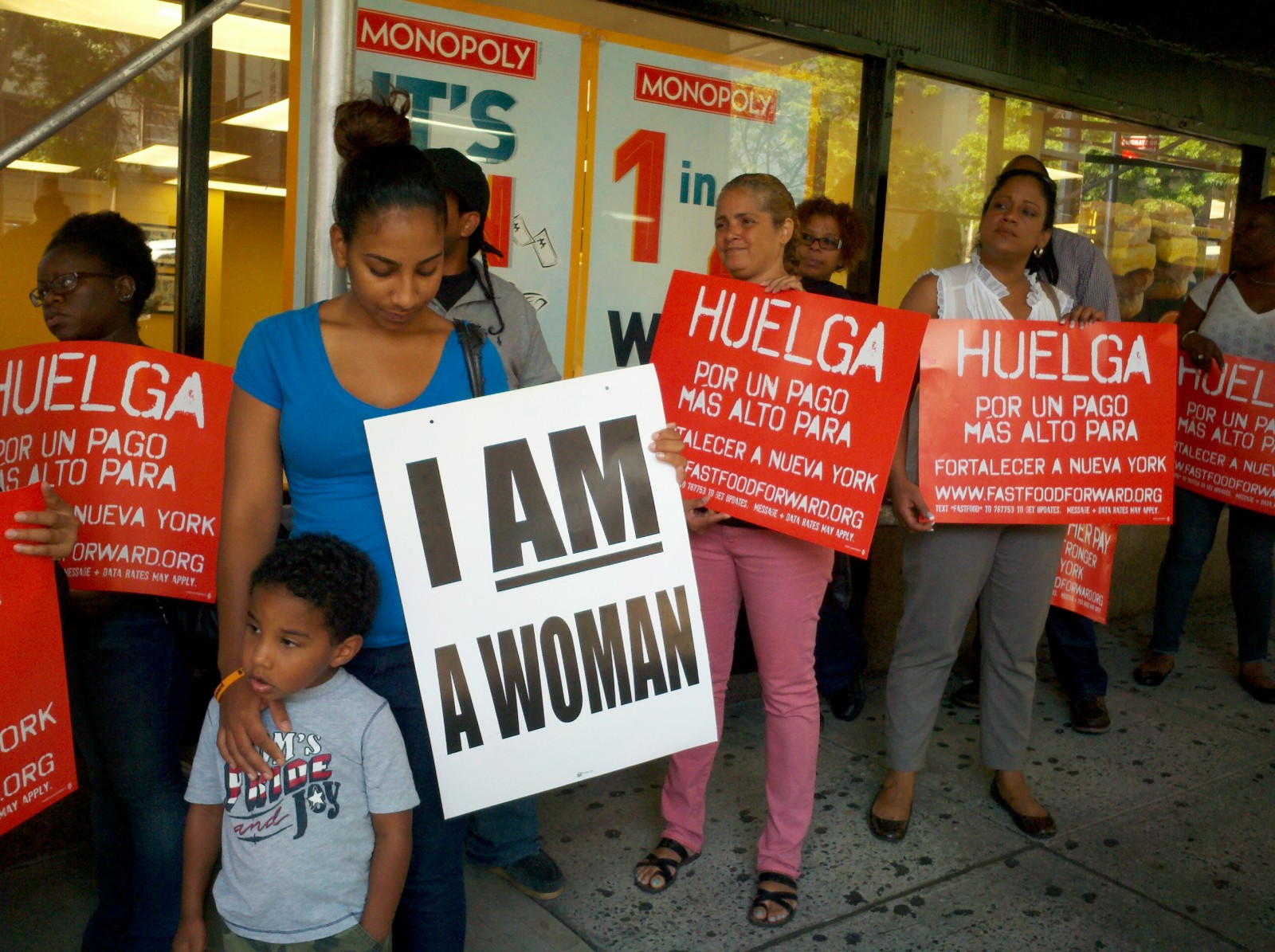
Pete is a Domino's driver in Milwaukee, Wisconsin, who makes $4 an hour. Even with tips, he still averages about minimum wage at the end of the day. Giovanni, a Pizza Hut worker in Milwaukee, makes minimum wage while living with his mother to help pay rent. He says a roughly $300 paycheck per week is not even enough for a month's rent on top of all the other costs of living. Pete, Giovanni, and roughly 1,000 other fast-food and low wage workers recently staged a one-day strike in Milwaukee, Wisconsin, protesting poverty wages while working for companies raking in billions in profits.
"I'm not just doing this for myself, I'm doing it for my mom, too," Giovanni says. "It's impossible to make it just on $7.25."
McDonald's makes $27 billion in annual revenue, which makes them the 90th largest economy in the world. Their CEO, who made $8.75 million last year and pays their U.S. employees right around the minimum wage of $7.25 an hour, recently made a budgeting guide showing McDonald's hourly employees how they can survive on the poverty wages their company pays them.
The sample budget included income from a second job (because there are so many out there) and budgeted just $600 for rent, $20 for healthcare, $250 for car payments and insurance combined, and $0 for heating costs. Even McDonald's, one of the most profitable food service companies in the history of the world, acknowledges that the workers who make their skyrocketing profits possible can't survive solely on the income McDonald's pays them.
The gap between salaries of McDonald's workers and the CEO is fairly typical. The incomes of the bottom 90% of Americans grew by roughly $59 in the last 40 years, while the incomes of the top 10% rose by an average of $116,071.
These fast-food joints like to argue that if they were to pay everyone a living wage and give them the right to collectively bargain with their bosses on an even playing field, they would go out of business. However, Australia's minimum wage is twice as high as ours, yet a Big Mac costs roughly the same. Australia's economy, unlike ours, weathered the last financial crisis and survived a meltdown due to their strong, well-paid consumer base, which has enough pocket money to spend and keep businesses open.
Minimum wage workers in Canada also make $3 to $4 more an hour compared to their American counterparts. And McDonald's is still far from going out of business. Unlike what detractors say about the movement of one-day strikes from Seattle to Milwaukee to New York, paying low wage and fast-food workers more money doesn't kill jobs. Rather, more people with more money in their pocket greatly boosts the economy over the long term.
This story by CNN Money demonstrated how even just a $9 minimum wage would affect consumer demand and job growth. Without demand, businesses can't make enough to pay employees, and layoffs are inevitable. A lack of demand is the natural result of austerity economics, which are aimed at firing public workers and privatizing public assets to further enrich those who are already far wealthier than a vast majority of the population. The workers aren't endangering the economy by asking for a fair wage and a union – their employers are, by denying it to them.
Some critics of the Fight for 15 campaign are the same ones who see employees as a cost, rather than an investment. McDonald's franchises, which have to pay royalties to the corporate parent for use of the golden arches and Ronald McDonald, say "labor costs" are roughly one-third of current revenue intake, even at the present poverty wages those employees are paid.
These arguments entirely miss the point and purpose of having a labor force to make sure the company's profits are stable. If all the workers choose to strike because of poverty wages, the restaurant has to shut down, and that franchisee's earnings are affected as well as the corporate parent's profits. Also, the corporate profits of McDonald's would only be mildly affected by doubling workers' wages. A Big Mac would only cost $0.68 more, or McD's corporate HQ could allow franchisees to keep more of the royalties they have to pay to the corporate parent.
Also, a union for employees is as "free market" as any ideal espoused by executives. Ensuring there's an even playing field for the employees and bosses to freely negotiate as equals is the definition of a free market, in which no one entity has an inherent advantage over any other party. A boss who says he believes in "free markets" but not unions doesn't know the definition of a free market. A workplace where one boss has more of a say than all of the workers combined is a monopoly on workers' rights.
But in a truly free market setting, employees could voice their concerns about their pay to their boss without fear of retaliation, and without the restaurant losing out on valuable revenue due to a worker strike, since the restaurant's profits aren't possible without the effort from workers. A union works out better for both the employees and the company. A free market is simply an agreement that all involved parties freely enter.
Some detractors argue that fast-food and low wage workers are all young, or lack the appropriate education level for other jobs, which is patently false. An NBC story cites numbers from the Bureau of Labor Statistics, showing not only that fast-food workers older than normal, but that 42% of employees over age 25 have some college education. One McDonald's in Massachusetts even required a college degree for a cashier job. The job market is very unstable for recent college grads, many of whom end up moving back home with their parents and working fast-food jobs despite having a 4-year or even a post-graduate degree.
Besides, even if they are of a certain age bracket or educational level, that doesn't mean they should be denied a share in the profits they make possible for their employer. It's immoral for an executive to make more in an hour than an hourly employee makes in a month. Workers deserve a living wage, and their work is valuable. Without these fast-food workers, who would provide Americans with their morning coffee or bagel, or their midday snack, or serve you food when you have a car full of hungry kids and no time to cook them a homemade meal?
Yet another argument is that $15 an hour is too high a demand. But the costs of food, healthcare, housing, and other basic living expenses are going up while wages are stagnating. If the minimum wage had the same buying power today as it did when it was first enacted, it would be roughly $11 an hour. Senator Elizabeth Warren has pointed out that if the minimum wage had kept up with worker productivity, it would now be $22 an hour.
CEOs aren't working 380 times harder than their hourly employees; they're just taking in way more pay than they should for the work they do. $15 an hour is a great starting point. If their employer agrees to unionize employees but raise wages from $7.25 an hour to $12.50 an hour, that's still a vast improvement from the status quo. And a union ensures that employees will be able to negotiate for more in the future, and do so on an even playing field.
In fact, it would even be a good business decision for McDonald's and all the other leading fast-food chains to announce that they're doubling workers' pay, because those workers make it possible for such restaurants to remain profitable and successful. If McDonald's poured some of their millions dedicated to advertising to make this point clear, I think most Americans would pay another dollar or two for a Big Mac, knowing the person making it was being paid enough to feed her children and keep her lights on.
Workers would regain their dignity and be proud of their job, and be more productive at work as a result. And those fast-food employees would have more money to cycle back into their local economies, keeping demand up and other businesses open. $15 an hour and a union isn't just best for these hard workers who deserve it, but best for all of us.
Originally published by Reader Supported News
3 WAYS TO SHOW YOUR SUPPORT
- Log in to post comments















